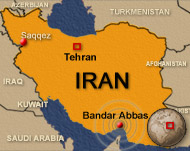Iran leader names oil minister, again
Iran’s president has made his fourth attempt in two months to name an oil minister by recommending Kazem Vaziri-Hamaneh, current caretaker of the key ministry, to parliament.

Mahmoud Ahmadinejad’s three previous nominees were shunned over their lack of experience, and the latest candidate appears to be the strongest so far – having held the post for three months on a temproary basis and having previously served as a deputy oil minister.
His nomination on Sunday also represents a big compromise by the hardline president, who has been pushing for a fresh face to purge a ministry that he claims has been run by a “mafia”, and for Iran’s huge oil revenues to be more fairly distributed.
A vote of confidence is expected to take place on 11 December, Gholam Ali Hadad-Adel, the parliamentary speaker, said in a session broadcast live on state radio.
Hatef Haeri, an oil consultant, told AFP: “It looks like a good decision to name someone from within the Oil Ministry. The atmosphere is more positive.”
|
“It looks like a good decision to name someone from within the Oil Ministry. The atmosphere is more positive” Hatef Haeri , oil consultant |
Parliament had rejected Ahmadinejad’s first choice on 29 August, arguing that the nominee lacked experience in a sector that accounts for 80% of Iran’s export revenues.
The president’s second nominee was withdrawn before a vote, and the third was rejected a week ago.
Hossein Afarideh, a member of the parliament’s Energy Commission, said: “There is no doubt that Vaziri-Hamaneh is the best option so far given his long record in the Oil Ministry.”
But the issue many deputies raised was their unease with Ahmadinejad’s style. The president has apparently refused to consult the parliament before presenting each nominee.
Foreign investments
Many MPs did give a frosty reaction when Vaziri-Hamaneh’s name was announced, although Afarideh said “the initially negative reaction will not be the final decision of deputies”.
Shokrollah Attarzadeh, another Energy Commission member, said:
 |
|
Many MPs gave a frosty reaction to |
“Since some deputies do not consider it good to once again reject the nominee, I think if Vaziri-Hamaneh consults with deputies he would win the confidence vote.”
Vaziri-Hamaneh is also a figure seen as unlikely to upset volatile international markets – or indeed efforts to secure greater foreign investment inside Iran.
On Sunday, he said the oil and gas “buy-back” scheme, set up for contracts with foreign companies to overcome a constitutional barrier to them holding equity, should be abandoned.
“But we will definitely have foreign partners in our contracts and we welcome foreign investment under appropriate conditions and prices,” he said.
Deputies have acknowledged that the dispute over the post has been damaging to investor confidence as well as Iran‘s standing within Organisation of Petroleum Exporting Countries (OPEC), where it is the number-two producer.
Oil profile
 |
|
Iran is said to hold 12% of world’s |
Iran, estimated to hold 12% of world oil reserves, produces 4.2 million barrels a day, or 5.2 % of global production.
The long-running dispute over the minister has also highlighted divisions within the Islamic republic’s dominant right-wing camp, a mix of more pragmatic and moderate conservatives and religious hardliners such as Ahmadinejad.
While parliament has approved Ahmadinejad’s radical choices for other portfolios, few appear willing to take such a step when it comes to the oil sector – the backbone of Iran‘s economy.
Iran‘s constitution, hammered out after the 1979 Islamic revolution, puts oil and gas within the state sector and forbids concessionary basis or direct equity stake production-sharing agreements with foreign firms.
Analysts have repeatedly said Iran – holder of the world’s second-largest oil and gas reserves – is under pressure at least to tweak the arrangement if it wants to meet targets to boost its oil production capacity to 5.4 million by 2010 and then to seven million by 2015.